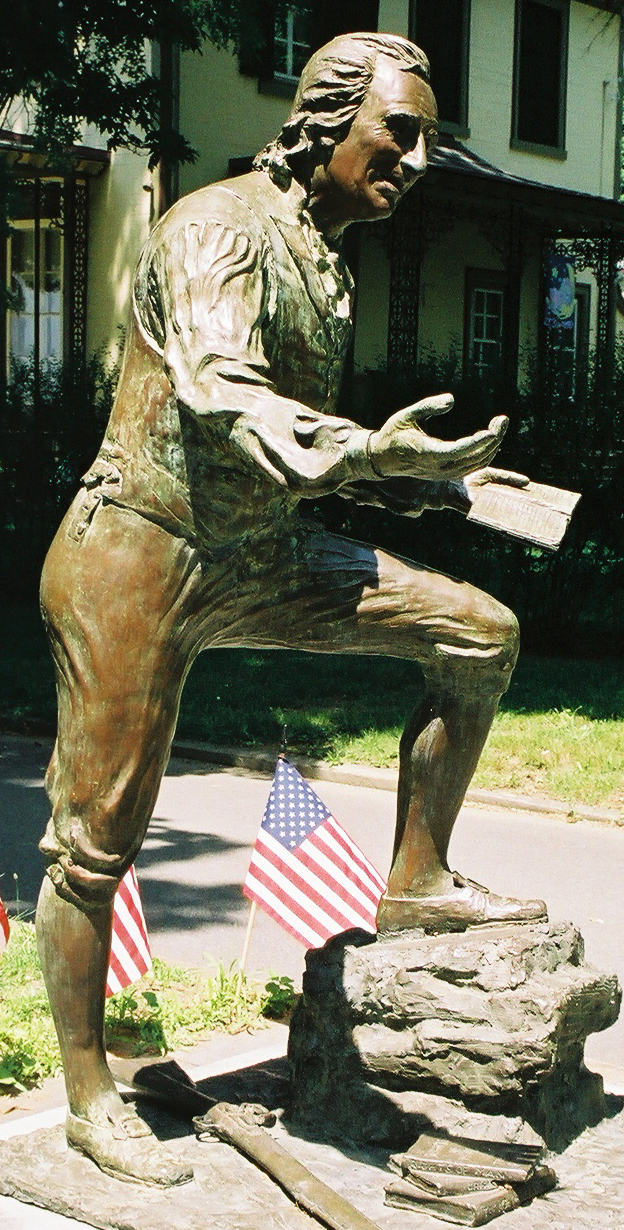
Online Texts for Craig White's Literature Courses
-
Not a critical or scholarly text but a reading text for a seminar; gratefully adapted from sources identified below
-
Changes may include paragraph divisions, highlights, spelling updates, bracketed annotations, & elisions (marked by ellipses . . . )
|
biographical information on Thomas Paine (1737-1809) |
|
Instructor's note: Our course website provides biographical information for Thomas Paine when it doesn't for other major figures of the USA's "Founding Generation." Why?
Students often find it difficult to feel interested in the Founders whose faces they see on American currency—familiarity breeds contempt! Paine, though, is less familiar, and may appear attractive as a rebellious outsider, in contrast to the Founders who are associated with our systems of government and economics. Paine's "rebellious outsider" status may anticipate the soon-to-appear Byronic Hero of the Romantic Era.
Another attraction to Paine may be that, while the other Founders wrote remarkably well, writing was Paine's only real contribution to the American and French Revolutions. Thereby he may also anticipate the modern conception of a writer as a specialist less at home in more worldly professions.
Paine's status as a "Founding Father" of the USA remains contested. Undoubtedly he was essential as a propagandist for the Revolutionary cause. However, he played little role in the constitutional development of the nation, and his writings on religion and associations with the French revolution made him politically radioactive for the rest of his life. For later Americans who advocate a more liberal or radical interpretation of the American Revolution, however, Paine remains an important champion of ideas.
The brief biographies below have been edited from the sources indicated.
![]()
|
Thomas Paine from ushistory.org: http://www.ushistory.org/PAINE/ |
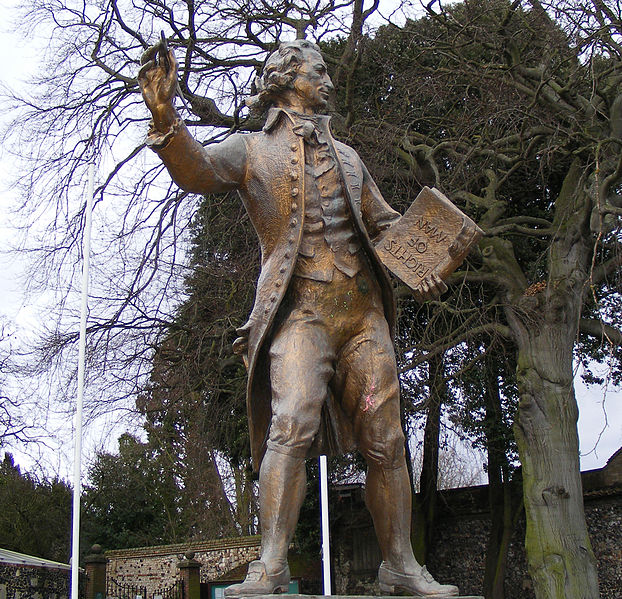 Statue of Paine at birthplace, Thetford, England (book in hand is Rights of Man, held upside down) |
[1.1] On January 29, 1737, Thomas Paine was born in Thetford, England. His father, a corseter*, had grand visions for his son, but by the age of 12, Thomas had failed out of school. The young Paine began apprenticing for his father, but again, he failed. So, now age 19, Paine went to sea. This adventure didn't last too long, and by 1768 he found himself as an excise (tax) officer in England. Thomas didn't exactly excel at the role, getting discharged from his post twice in four years, but as an inkling of what was to come, he published The Case of the Officers of Excise (1772), arguing for a pay raise for officers. In 1774, by happenstance, he met Benjamin Franklin in London, who helped him emigrate to Philadelphia.
[1.2] His career turned to journalism while in Philadelphia, and suddenly, Thomas Paine became very important. In 1776, he published Common Sense, a strong defense of American Independence from England. He traveled with the Continental Army and wasn't a success as a soldier, but he produced The Crisis (1776-83), which helped inspire the Army. This pamphlet was so popular that as a percentage of the population, it was read by or read to more people than today watch the Super Bowl.
[1.3] But, instead of continuing to help the Revolutionary cause, he returned to Europe and pursued other ventures, including working on a smokeless candle and an iron bridge. In 1791-92, he wrote The Rights of Man in response to criticism of the French Revolution. This work caused Paine to be labeled an outlaw in England for his anti-monarchist views. He would have been arrested, but he fled for France to join the National Convention*. [*National Convention = revolutionary legislature in France, 1792-95]
[1.4] By 1793, he was imprisoned in France for not endorsing the execution of Louis XVI. During his imprisonment, he wrote and distributed the first part of what was to become his most famous work at the time, the anti-church text, The Age of Reason (1794-96). He was freed in 1794 (narrowly escaping execution) thanks to the efforts of James Monroe [6th U.S. President], then U.S. Minister to France. Paine remained in France until 1802 when he returned to America on an invitation from Thomas Jefferson. Paine discovered that his contributions to the American Revolution had been all but eradicated due to his religious views. Derided by the public and abandoned by his friends, he died on June 8, 1809 at the age of 72 in New York City.
![]()
|
Thomas Paine Biography http://www.biographybase.com/biography/Paine_Thomas.html |
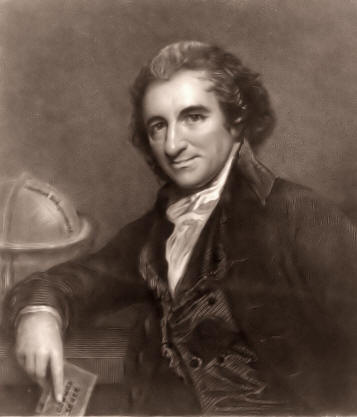 |
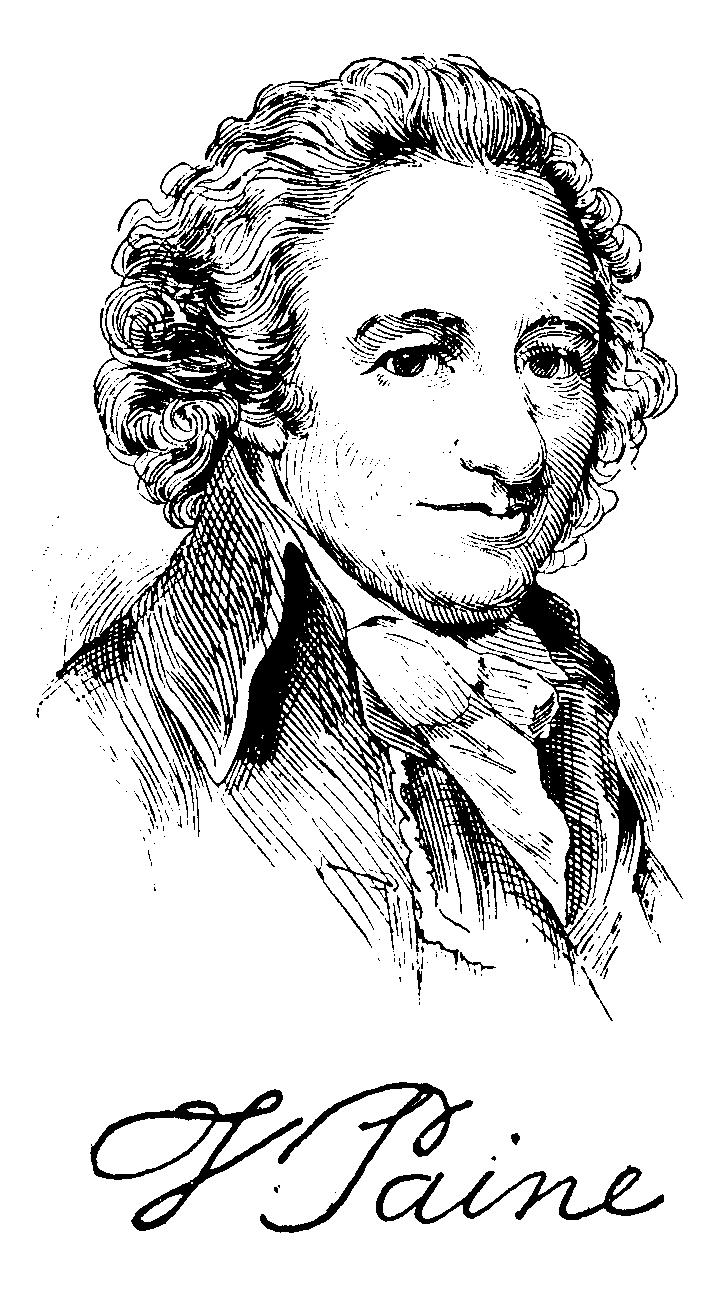 |
The radical propagandist and voice of the common man, Thomas Paine, was born in Thetford in Norfolk on January 29, 1737. His father, Joseph, was a poor Quaker corset maker who tried to provide his son with an education at the local grammar school but eventually was forced to apprentice him to his trade. Paine was unable to accept this occupation. After a short time at sea, Paine returned to his trade in Kent, but then served as an exciseman in Lincolnshire, followed by a stint as a school teacher in London, before he again settled down in 1768 as an excise officer in Lewes in East Sussex. For the next six years he combined his duties as excise officer with managing a small shop. His first wife had died in 1760, within a year of their marriage. In 1771 he married again. Both marriages were childless and neither brought Paine much in the way of happiness. He was legally separated from his second wife in 1774, just as he was about to embark for the American colonies.
At Lewes, Paine was active in local affairs, serving on the town council and establishing a debating club at a local tavern. As a shopkeeper, however, he was a failure. In April 1774, Paine was discharged from his duties [as a tax officer] for having absented himself from his post without leave. He published the pamphlet The Case of the Officers of Excise (London, 1772), and had devoted too much time campaigning in London on behalf of the excise officers. In London he met Benjamin Franklin who helped him to emigrate to America in October 1774.
Paine settled in Philadelphia where he soon began a new career as a journalist. He contributed articles to the Pennsylvania Magazine on a wide range of topics. Thus on January 10, 1776, he published a short pamphlet, Common Sense, which immediately established his reputation as a revolutionary propagandist. Although he had only been in America less than a year, Paine committed himself to the cause of American independence. He attacked monarchical government and the alleged virtues of the British constitution, opposing any reconciliation with Great Britain. He also urged an immediate declaration of independence and the establishment of a republican constitution.
Paine was convinced that the American Revolution was a crusade for a superior political system and that America was ultimately unconquerable. He did as much as any writer could to encourage resistance and to inspire faith in the Continental Army. I essays published in the Pennsylvania Journal under the heading "Crisis," Paine attacked the faint-hearted, campaigned for a more efficient federal and state tax system to meet the costs of war, and encouraged the belief that Britain would eventually recognize American independence.
Often tactless, Paine provoked considerable controversy. He was invariably hard-pressed for money and had to depend upon the generosity of his American friends and the occasional reward from the French envoy in America. When the War came to an end, his financial position was so precarious that he had to campaign to obtain recompense from the government. Congress eventually rewarded him $3000. Pennsylvania granted him £500 in cash, while New York proved more generous and gave him a confiscated Loyalist farm at New Rochelle.
After American independence had been won, Paine played no part in the establishment of the new republic. Instead, he busied himself trying to invent a smokeless candle and devising an iron bridge.
Restless because he was no longer at the center of affairs, Paine left for Europe in 1787. For the next four years he divided his time between Britain and France. Although he spent much of his time trying to find financial support for his iron bridge, he eventually resumed work as a revolutionary propagandist in the 1790s. Burke's resistance to the French Revolution inspired Paine to write his most influential work, the Rights of Man (Part I in 1791, Part II in 1792). In Part I, Paine urged political rights for all men because of their natural equality in the sight of God. All forms of hereditary government, including the British constitution, were condemned because they were based on farce or force. Only a democratic republic could be trusted to protect the equal political rights of all men. Part II was even more radical for Paine argued for a whole program of social legislation to deal with the shocking condition of the poor. His popularity sounded the alarm and he was forced to leave Britain in September 1792. He was condemned in his absence and declared an outlaw.
Paine immediately immersed himself in French affairs for the next ten years although he still hoped to see a revolution in Britain. In his Letter Addressed to the Addressers of the Late Proclamation (London, 1792), he rejected the policy of appealing to parliament for reform and instead urged British radicals to call a national convention to establish a republican form of government.
In August 1792, Paine was made a French citizen and a month later was elected to the National Convention*. Since he did not speak French, and had to have his speeches read for him, Paine did not make much of an impact on the Convention. His association with the moderate republicans (Girondins) made him suspect in the Jacobin camp. In January 1793, he alienated many extremists by opposing the execution of Louis XVI. When military defeat fanned Jacobinism into hysteria, he fell victim to the Terror. From December 28, 1793, until November 4, 1794, he was incarcerated in Luxembourg prison until the intercession of the new American minister, James Monroe, secured his release. [*National Convention = revolutionary legislature in France, 1792-95]
During his imprisonment, Paine embarked on his third influential work, The Age of Reason (London and Boston, 1794-95). A manifesto to the core, Paine acknowledged his debt to Newton and declared that nature was the only form of divine revelation, for God had clearly established a uniform, immutable and eternal order throughout creation. Paine rejected Christianity, denied that the Bible was the revealed word of God, condemned many of the Old Testament stories as immoral and claimed that the Gospels were marred by discrepancies. There was nothing really that new in Paine's argument, but the bitterness of his attack on the Christian churches and his attempt to preach deism to the masses made him more enemies than before.
After wearing out his welcome in Paris, Paine finally returned to America in October 1802 and was well-received by Thomas Jefferson. Increasingly neglected and ostracized, Paine's last years were marked by poverty, poor health and alcoholism. When he died in New York on June 8, 1809, he was virtually an outcast. Since he could not be buried in consecrated ground, he was laid to rest n a corner of his small farm in New Rochelle.
Paine never established a political society or organization and was not responsible for a single reforming measure. His achievements were all with his pen so it is difficult to accurately assess his influence. Although he spent more than ten years in France, he had very little influence on the course of the French Revolution. He did not really understand the Revolution and therefore had little impact on its intellectual foundations. Indeed, to the Jacobins on the far left, Paine appeared as too moderate and faint-hearted.
Paine's political influence was greatest in England. In intellectual terms, his Rights of Man was his greatest political work and was certainly the best-selling radical political tract in late 18th century England. Before Paine, British radicals sought a reform of Parliament which would grant to all men the vote for members of the House of Commons. In his Rights of Man, Paine abandoned this approach and, rejecting the lessons of history, maintained that each age had the right to establish a political system which satisfied its needs. He rested his case on the moral basis of the natural equality of men in the sight of God. Since government is a necessary evil that men accepted as a means of protecting their natural rights (cf. John Locke), the only legitimate government was that established by a contract between all members of society and one in which all men preserved all their natural rights, except the individual right to use force. Paine argued rationally that all men had an equal claim to political rights and that government must rest on the ultimate sovereignty of the people.
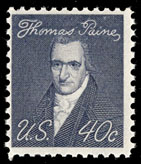
U.S. postage stamp 1969
